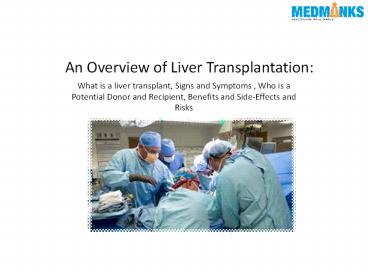An Overview of Liver Transplant-MedMonks - PowerPoint PPT Presentation
Title:
An Overview of Liver Transplant-MedMonks
Description:
Individuals diagnosed with irreversible acute or chronic liver disease serve as the best candidates for liver transplantation – PowerPoint PPT presentation
Number of Views:117
Title: An Overview of Liver Transplant-MedMonks
1
What is a liver transplant, Signs and Symptoms
, Who is a Potential Donor and Recipient,
Benefits and Side-Effects and Risks
An Overview of Liver Transplantation
2
Introduction
3
Liver transplantation is a procedure in which the
diseased liver (of the recipient) is replaced
with a fresh one (of the donor).
4
- Being time-consuming and demanding, liver
transplantation procedure is only performed on
patients with liver failure or end-stage liver
disease.
5
Reasons for Liver Transplantation
The need of the liver transplant arises in
patients with liver failure. A variety of liver
disorders can result in liver failure. Some of
the most common liver diseases are 1. Acute
hepatitis (an inflammation in the liver tissue)-
Viral hepatitis, hepatitis A, B, C, D,
autoimmune hepatitis. 2. Fatty liver disease
(large vacuoles of fat build-up in liver cells
leading to dysfunction)
6
Reasons for Liver Transplantation
- 3. Cirrhosis -scarring of the liver caused due to
long-term damage. - 4. Cancer (caused when hepatitis, cirrhosis etc.
aggravates)-Hepatocellular carcinoma (HCC),
hepatoblastoma, Cholangiocarcinoma. - 5. Drug-induced liver issues Intake of
prescription, over-the-counter (OTC) drugs,
various types of herbal supplements, vitamins,
and dietary supplements such as acetaminophen,
Tylenol, and others for a long period of time can
stop the liver to function normally.
7
- Immune (defense) System abnormalities Genetic
(hereditary) Abnormalities Due to disorders such
as autoimmune hepatitis, primary biliary
cirrhosis, and more, the immune system of the
body begins to attack parts of the body including
liver. - Over consumption of alcohol and other reasons
such as metabolic problems.
8
Signs and Symptoms
- Skin and eyes appear yellowish (jaundice)
- Bleeding and bruising
- Swelling in the legs and ankles
- Extreme Tiredness
- abdominal pain,
- Itchy skin,
- Dark urine color,
- Pale stool color, or bloody or tar-colored stool,
- Nausea or vomiting,
- and loss of appetite.
9
Who can be the recipient?
- Individuals diagnosed with irreversible acute
or chronic liver disease serve as the best
candidates for liver transplantation. This
decision is made by the surgeon and associated
doctor purely on the basis of screening
examinations and respective diagnostic
procedures.
10
Who Cannot be a Recipient
- There are a few conditions that
disqualifies an individual from being added on
the recipient list such absolute contradictions
can be caused if the concerned patient is
suffering from AIDS, metastatic cancer, chronic
active infection, active substance abuse,
advanced heart or lung disease, and chronic form
of a liver disease coupled with serious alcohol
abuse.
11
Who can be a Donor
- To ensure the best results, two types of
donor namely diseased donor and a living
donor can be used in executing a liver
transplantation process. - While the liver attained from a diseased
donor (someone who has died) is used to perform
the procedure on adult recipients, in particular,
liver derived from the living donor is used to
perform the surgery on younger patients.
12
Who cannot be a donor?
- People suffering from a range of health
conditions including, liver disease, diabetes,
heart disease, or cancer fail to qualify.
13
Benefits of Liver Transplant
- The life of the patient, who has undergone this
surgery, increases. After the transplant, he or
she can lead a normal, healthy and an active
lifestyle in no time. - The recovery period is lower adhere to the
strict guidelines, and routine checkups
instructed by the surgeon or operating doctor.
Also, one should take anti-rejection medications
religiously.
14
Common Side-Effects of Liver Transplant
- Due to intake of drugs that treat or prevent
rejection, side-effects like fluid retention,
raised blood pressure, headaches, diarrhea, and
nausea can occur.
15
Risks
- Factors such as heavy alcohol use, injection
of drugs using shared needles, tattoos or body
piercings, blood transfusion before 1992,
exposure to other people's blood and body fluids,
and harmful chemicals or toxins, unprotected sex,
presence of health conditions like Diabetes,
obesity can put enhance the risks of liver
disease in the body.
16
Contact Us -
Address- 706, Pearl Business Park, Netaji
Subhash Place, Pitampura, New Delhi, Delhi
110034 Email ID- wecare_at_medmonks.com Website-htt
ps//medmonks.com/liver-transplant-india Contact
no- 917683088559
17
- THANK YOU!!!!































